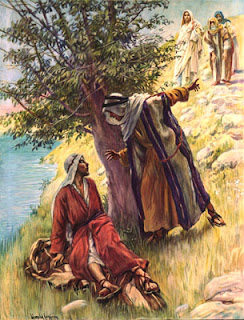-------------------------
As He began His ministry, Jesus chose apostles, including James and Philip whom we honor today.
We really know little about these two men, other than the fact that they were both apostles. We know almost nothing about James, son of Alphaeus. Most scholars believe he's the James of Acts who became Bishop of Jerusalem and is the traditional author of the Letter of James. And so he's often called "James the Lesser" to avoid confusing him with James, the son of Zebedee, John's brother, also an apostle and known as "James the Greater."
We know a bit more about Philip, and according to John's Gospel, he came from Bethsaida, as did Peter and his brother, Andrew. He might well have been their friend and business partner.
 |
| "Come and see..." |
And before Jesus, multiplied the loaves and fishes, He asked Philip how they should feed the crowd. Philip, the businessman, calculated what it would cost and concluded it simply couldn't be done. John then added:
"Jesus said this to test him, because He himself knew what He was going to do" [Jn 6:6].John really wasn't criticizing Philip. He was just reminding us that these men, who would go on to lead the Church, must accept both our total helplessness apart from God and the call to be bearers of divine power by God's gift [2 Pt 1:3-10].
Like his fellow apostles, Philip took a long time to realize who Jesus was. Consider today's Gospel passage. After Thomas admitted they didn't know where Jesus was going, Jesus said,
"I am the way...If you know Me, then you will also know My Father. From now on you do know Him and have seen Him" [Jn 14:6-7].Confused, Philip chimed in with,
"Master, show us the Father, and that will be enough for us" [Jn 14:8]
"Have I been with you for so long a time and you still do not know me, Philip? Whoever has seen me has seen the Father" [Jn 14:9]Again in John's gospel, Philip was the first to whom Jesus said, "Follow me!" [Jn 1:43] How very appropriate that seems.
But is Philip really very different from you and me? He puts into words the deepest and most universal human aspiration: to see God.
"Master, show us the Father..." [Jn 14:8]Centuries before, when Moses said, "Show me your glory, I beg you" [Ex 33:18], how did God reply?
"I will let all my splendor pass in front of you...but you cannot see my face...I will... shield you with my hand while I pass by. Then I will take my hand away and you shall see the back of me; but my face is not to be seen." [Ex 33:19-23]
Brothers and sisters, Jesus is the face of God turned to us. We see God in him, to the very limit of our seeing [2 Cor 3:18].
It really means little that the lives of these men are so obscure, for it's not their personalities and backgrounds that are important. Jesus didn't look to the elite of His day when He chose His Apostles. None were particularly holy. And they certainly weren't great leaders or intellectuals. No, Jesus called this obscure group of regular guys, men with jobs, homes, and families. But when they responded, the Spirit began to conform them to the image of the One they served. And their lives would never be the same.
It's not what they were, but what God made of them, what He did through them, that matters. Chosen by Jesus, these witnesses to His Resurrection became the foundation of His Church.
And let us never forget that Jesus told His apostles:
"He who hears you, hears Me. He who rejects you, rejects Me" [Lk 10:16].With these words Jesus reminds us to pay close attention to the Apostles' teaching, a teaching that continues in the Catholic Church through their successors, the Pope and our bishops.
This is the danger of the "cafeteria Catholicism" so common today. We must not pick and choose, forming our own convenient opinions regarding the tenets of our faith or the moral issues on which the Church has spoken definitively.
And as baptized believers, we share in the Apostles' calling. We, too, are commissioned to bring the light of the gospel into the world. We, too, have been "sent forth."
Like Philip and James. We have encountered the risen Christ in our lives, and are sent as witnesses to testify to the transforming power of God's love.
What God did for them and their brothers, He will do for us if only we respond in faith.


No comments:
Post a Comment